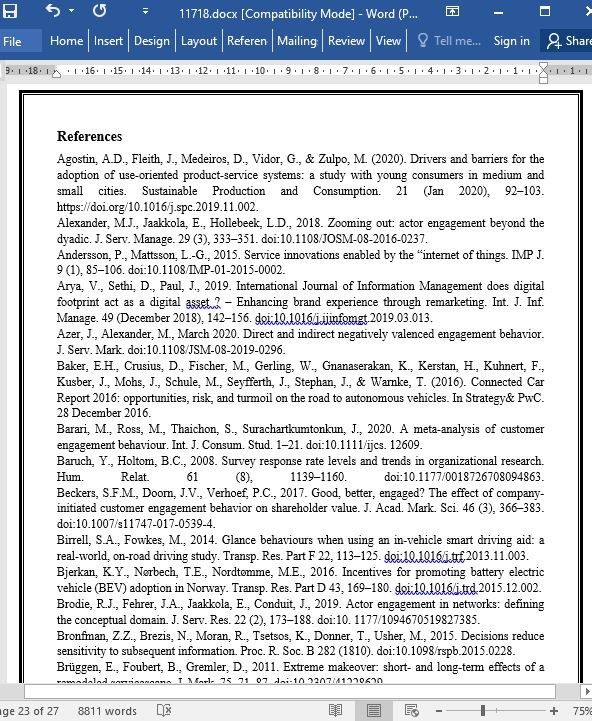
تاثیر ویژگی های اتصال هوشمند بر مشارکت مشتری در خودروهای برقی
چکیده
حمل و نقل پایدار یکی از راه حل های مقابله با گرمایش زمین است زیرا حمل و نقل جاده ای مسئول بخش قابل توجهی از کل انتشار کربن است. فناوری خودروهای برقی (EV) هنوز در حال رشد بوده و اغلب برندهای موجود در مقایسه با خودروهای سنتی مبتنی بر موتور احتراق داخلی، از سوی بازار، خودروهای دوستدار محیط زیست و یا از نظر عملیاتی اقتصادی محسوب می شوند. با این حال، میزان پذیرش خودروهای برقی در سراسر جهان ناچیز است. مشارکت مشتری (CEN) یکی از مفاهیم نوظهور در جلب و حفظ کاربران یک محصول می باشد. تحقیق حاضر به تجزیه و تحلیل CEN در EVها بر اساس ویژگی ها و فناوری های جذاب تر یعنی ویژگی های اتصال هوشمند می پردازد. متاسفانه، این حوزه تحقیقاتی حیاتی همچنان در دانشگاه ها ناشناخته است. نقش تجربه مشتری و ارزش برند از دیدگاه مشتری نیز در رابطه با ویژگی های اتصال هوشمند و CEN مورد تجزیه و تحلیل قرار می گیرد. این مطالعه از مدلسازی معادلات ساختاری مبتنی بر حداقل مربعات جزئی برای تجزیه و تحلیل داده های واصله از طریق نظرسنجی مبتنی بر وب بهره می برد. نتایج نشان می دهد که ویژگی های اتصال هوشمند تاثیر مثبت و معنی داری بر CEN در EVها دارند. همچنین، ویژگی های اتصال هوشمند نیز از طریق تجربه مشتری تاثیر غیرمستقیم و معنی داری بر CEN دارند. ضمناً، ارزش برند از دیدگاه مشتری تاثیر مستقیمی بر تجربه مشتری داشته و ارزش برند از دیدگاه مشتری تاثیر غیرمستقیم و معنی داری بر CEN در EVها دارد. این نتایج دارای پیامدهای نظری و مدیریتی مهمی هستند.
۱. مقدمه
در سال ۲۰۱۹، بهره برداری از 7.2 میلیون خودروی برقی (EV) در سراسر جهان از کاربرد حدود ۶۰۰۰۰۰ بشکه فرآورده های نفتی در روز و معادل انتشار ۵۳ تن دی اکسید کربن در سطح جهان جلوگیری نمود که اگر EVها جایگزین خودروهای با سوخت مشتقات نفتی نشده بود، منتشر می شد (IEA، ۲۰۲۰). اگر چه سهم بازار EVها به طور متوسط تا ۶۰ درصد در طی سال های ۲۰۱۴ الی ۲۰۱۹ افزایش داشته (IEA، ۲۰۲۰) اما نرخ گسترش این فناوری دوستدار محیط زیست بسیار اندک بوده به طوری که EVها تنها ۲.۵ درصد کل فروش خودرو را در سال ۲۰۱۹ به استثناء نروژ (۵۵.۹ درصد) و هلند (۱۵.۱ درصد) به خود اختصاص دادند (جرسدورف و همکاران، ۲۰۲۰).
۵. نتیجه گیری
مقاله حاضر به بررسی تجربی مدل استفاده از ویژگی های اتصال هوشمند در EVها و نقش آن ها در افزایش تجربه مشتری و مشارکت مشتری می پردازد. این مطالعه نشان داد که ویژگی های اتصال هوشمند از طریق تجربه مشتری تاثیر مستقیم و غیرمستقیم معنی داری بر مشارکت مشتری دارند. به همین ترتیب، ارزش برند از دیدگاه مشتری تاثیر مستقیمی بر تجربه مشتری دارد. با این حال، نقش تعدیل کنندة پیشنهادی ارزش برند از دیدگاه مشتری بر رابطه بین ویژگی های اتصال هوشمند و تجربه مشتری از سوی داده ها تایید نشد.
Abstract
Sustainable transportation is one of the solutions to global warming because road transport is responsible for a considerable part of the total carbon emissions. Electric vehicle (EV) technology is still developing, and most of the available brands market them as either environmentally friendly or operationally economical compared to internal combustion engine based traditional vehicles. However, the adoption rates of electric vehicles across the globe are meager. Customer engagement (CEN) is one of the emerging concepts for gaining and retaining users of a product. This research analyzes CEN in EVs based on more engaging features and technologies, i.e., smart connectivity features. Unfortunately, this vital research area remains unexplored in academia. The role of customer experience and customer brand value is also analyzed in relation to smart connectivity features and CEN. The study uses partial least square-based structural equation modeling to analyze the collected data through a web-based survey. The results show that smart connectivity features have a significant positive impact on CEN in EVs. Smart connectivity features also have a significant indirect effect on CEN through customer experience. Further, customer brand value has a direct impact on customer experience, and customer brand value also has a significant indirect effect on CEN in EVs. These results have significant theoretical and managerial implications.
1. Introduction
In 2019, the 7.2 million electric vehicles (EVs) in operation worldwide avoided the use of around 600,000 barrels of petroleum products per day, and 53 t CO2 equivalent emissions globally which would have been emitted if EVs had not replaced petroleumpowered vehicles (IEA, 2020). Although the market share of EVs has expanded on average by 60% annually during 2014–2019 (IEA, 2020), the penetration rate of this environmentally friendly technology is very low as EVs accounted for only 2.5% of the total global vehicle sales in 2019, with the exception of Norway (55.9%) and Netherlands (15.1%) (Gersdorf et al., 2020).
5. Conclusions
The paper empirically tests a model for the use of smart connectivity features in EVs and their role in enhancing customer experience and customer engagement. The study found that smart connectivity features have a significant impact on customer engagement both, directly and indirectly through customer experience. Similarly, customer brand value has been found to impact customer experience directly. However, the proposed moderating role of customer brand value on the relationship between smart connectivity features and customer experience is not validated by the data.
چکیده
۱. مقدمه
2. بررسی ادبیات
۲.1. ویژگی های اتصال هوشمند و مشارکت مشتری در خودروهای برقی
2.2. ویژگی های اتصال هوشمند و تجربه مشتری در خودروهای برقی
۲.۳. تجربه مشتری و مشارکت مشتری در خودروهای برقی
2.4. ارزش برند از دیدگاه مشتری
۳. روش ها
۴. نتایج و بحث
۴.۱. پایایی و روایی سازه ها
۴.۲. برآورد مدل مسیر
۴.۳ بوت استراپینگ مدل اندازه گیری
4.4. بوت استراپینگ مدل مسیر
4.5. پیامدهای عملی و نظری
4.6. محدودیت ها
۵. نتیجه گیری
ضمیمه الف
منابع
Abstract
1. Introduction
2. Literature review
2.1. Smart connectivity features and customer engagement in electric vehicles
2.2. Smart connectivity features and customer experience in electric vehicles
2.3. Customer experience and customer engagement in electric vehicles
2.4. Customer brand value
3. Methods
4. Results and discussion
4.1. Constructs’ reliability and validity
4.2. Path model estimation
4.3. Bootstrapping of measurement model
4.4. Bootstrapping of the path model
4.5. Practical and theoretical implications
4.6. Limitations
5. Conclusions
Declaration of Competing Interest
Appendix A
References
- اصل مقاله انگلیسی با فرمت ورد (word) با قابلیت ویرایش
- ترجمه فارسی مقاله با فرمت ورد (word) با قابلیت ویرایش، بدون آرم سایت ای ترجمه
- ترجمه فارسی مقاله با فرمت pdf، بدون آرم سایت ای ترجمه



